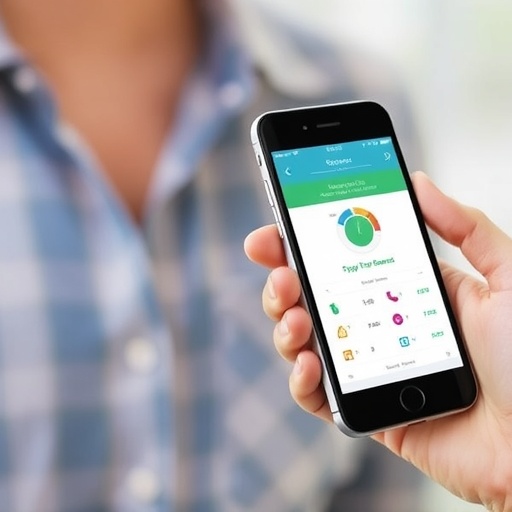A recent study published in Diabetes Therapy sheds profound light on the impact of mobile health applications, particularly mySugr®, on glycemic control among individuals with diabetes mellitus in India. As digital health solutions gain momentum globally, researchers Mohan, Kalra, Augustine, and their colleagues have embarked on a real-world data analysis that delves into how technology can reshape diabetes management. Their findings reveal not only the effectiveness of such applications but also their potential to transform patient outcomes on a larger scale.
Diabetes has emerged as a significant public health concern worldwide, particularly in developing countries like India, where the prevalence continues to rise alarmingly. The burden of diabetes is not just a matter of economic concern but also one of health disparity, leading to complications that exacerbate the disease’s impact on individuals and the healthcare system. In this context, the study’s focus on a mobile health application is particularly timely. The researchers set out to evaluate whether the mySugr® app could indeed facilitate better glycemic control and enhance the quality of life for patients.
The methodology employed in this study is both robust and comprehensive. The research capitalizes on real-world data, which is increasingly gaining favor in clinical assessments due to its practicality and relevance. By harnessing data collected from users of the mySugr® application, the authors have been able to illustrate how effectively the app engages users in their diabetes management. They examined metrics such as blood glucose levels, medication adherence, and lifestyle choices, providing a holistic overview of diabetes management through digital means.
One of the standout features of the mySugr® application is its user-friendly interface and interactive tools designed to motivate and guide users. The app allows individuals to log their blood glucose readings, dietary habits, and physical activity levels. By integrating these various aspects of diabetes management into a single platform, mySugr® empowers users to take ownership of their health. As identified in the study, users who actively engaged with the app demonstrated significant improvements in their glycemic control.
Moreover, the study presents compelling evidence that highlights how mobile health technologies can create a new paradigm in diabetes care. The insights gleaned from the data show that consistent app usage correlates positively with lower HbA1c levels and an overall improvement in diabetes self-management. Such findings bear considerable implications for both patients and healthcare providers, suggesting that leveraging technology could be a key strategy in addressing the diabetes epidemic.
In addition to improved blood glucose levels, the research also touches on the psychological benefits associated with using the mySugr® app. Stress and anxiety are common among individuals managing chronic diseases. The interactive nature of the app and its gamified elements provide motivation and encouragement, which can alleviate some of the psychological burdens that accompany diabetes management. This holistic approach to treatment is gaining acknowledgment in the medical community as critical to ensuring better health outcomes.
While the findings are promising, the authors caution against placing excessive reliance on technology. They emphasize that mobile health applications should complement, rather than replace, traditional healthcare practices. The integration of these digital tools into comprehensive care plans will ensure that users receive the benefits of both technology and the expertise of healthcare professionals. It is crucial to find a balance that leverages the strengths of each approach in managing chronic diseases.
Furthermore, the research acknowledges the need for continued advancements in technology to further cater to diverse population needs. The demographic landscape in India is varied, with different socio-economic factors affecting health outcomes. Future applications should be designed with inclusivity in mind, ensuring they can be a valuable resource for all sectors of society, including those with limited technological access or understanding.
The study also opens a dialogue about data privacy and security, which remain paramount in the development and deployment of mobile health applications. Users must be assured that their personal health information is protected as they engage with these digital tools. The researchers advocate for stringent measures and transparent practices to foster greater trust among users, thus enhancing their willingness to adopt these technologies.
As the research community continues to explore the potential of mobile health applications, it is essential to share findings and best practices broadly. The enhancements seen in glycemic control through tools like mySugr® can be replicated in different endpoints and settings across the globe. The ultimate goal remains clear: to improve the quality of life for those living with diabetes and to reduce the burden of this condition on healthcare systems.
The exploration of mobile health solutions marks a transformative shift in managing chronic diseases. As this field evolves, ongoing research and user feedback will be instrumental in refining these applications. By fostering a collaborative environment between designers, healthcare providers, and patients, the future of diabetes management looks hopeful and promising. This study serves as a stepping stone into an era where technology and healthcare converge to create innovative solutions for pressing health challenges.
In conclusion, the analysis of the mySugr® mobile health application illustrates a positive step forward in diabetes management within the context of India’s burgeoning healthcare landscape. With its potential to improve glycemic control and enhance patient engagement, the app embodies a significant stride towards modernizing how diabetes is managed globally. As healthcare continues to evolve, embracing technology while prioritizing user-centric designs will be fundamental in addressing the health challenges of the future.
Subject of Research: The impact of mySugr® mobile health application on glycemic control in individuals with diabetes mellitus in India.
Article Title: Evaluating the Impact of mySugr® Mobile Health Application on Glycemic Control in People with Diabetes Mellitus in India: A Real-World Data Analysis.
Article References:
Mohan, V., Kalra, S., Augustine, A. et al. Evaluating the Impact of mySugr® Mobile Health Application on Glycemic Control in People with Diabetes Mellitus in India: A Real-World Data Analysis.
Diabetes Ther 16, 1681–1693 (2025). https://doi.org/10.1007/s13300-025-01768-x
Image Credits: AI Generated
DOI: https://doi.org/10.1007/s13300-025-01768-x
Keywords: Mobile Health, Diabetes Management, Glycemic Control, mySugr®, Digital Health Solutions, Real-World Data Analysis.




